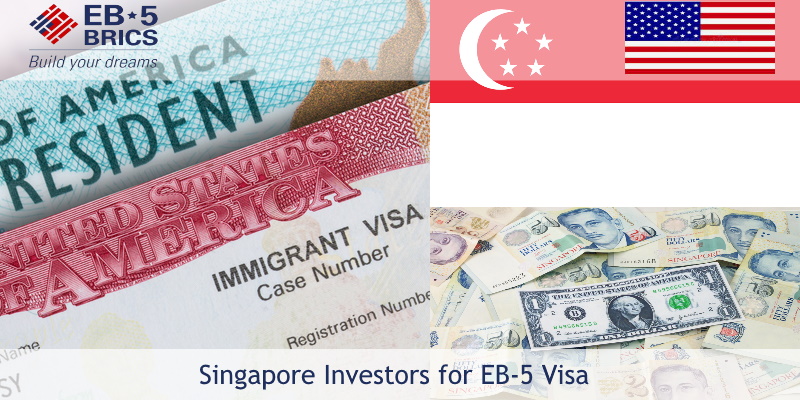
The EB-5 Visa for Singapore investors is an immigrant visa that permits permanent residence (green card) in the United States. Permanent residence (green card) allows Singapore investors and their families to permanently live and work in the US. The requirement for EB5 Visa for Singaporean investors is a minimum investment that generates at least 10 full-time jobs for US citizens. The application for EB-5 Visa for Singaporean investors is on “current” status.
The EB5 Visa is a direct US immigration path for Singapore investors, their spouses, and minor children. Children of Singapore investors can study and be employed in the US with a green card. The EB-5 Visa for Singapore investors allows them to expand their investments and create businesses in the US.
Table of Contents
What is EB-5 Visa for Singapore Investors?
The EB-5 Visa for Singapore investors is an immigrant visa that permits the application for permanent residence (green card) in the United States. Permanent residence (green card) allows Singapore investors to work and reside in the U.S. indefinitely. The qualifications for EB5 Visa for Singaporean investors include a minimum investment and job creation for at least 10 full-time American employees.
What are the Benefits of EB-5 Visa for Singaporean Investors?
The following are the benefits of the EB-5 Visa for Singaporean investors and their dependents.
- Education and employment opportunities. Singaporean investors with EB-5 Visa can send their children to study in the US and gain wider employment opportunities. These are the benefits that your unmarried children with a green card can enjoy.
- Study in some of the best institutions in the world without facing restrictions imposed on foreign students.
- Pay 150% to 300% lower tuition fees as compared to foreign students.
- Enjoy more funding and scholarship options as compared to foreign students.
- Study as a day scholar and avoid long separation from family just to obtain a quality education.
- Explore job opportunities without worrying about issues like work permits, sponsorship, processing delays, expiry of visa, or restrictions on job mobility.
- Investment opportunities. Singaporean investors can expand their investments and create businesses in the U.S. with the EB5 Visa.
- Green card and citizenship. The EB-5 Visa for Singaporean investors is a direct path to a U.S. green card. The EB5 Visa for Singaporean investors allows for permanent US residence for the investor, his/her spouse, and minor children. A US citizenship grants the right to vote and a US passport.
- Singaporean investors enjoy greater international mobility through the visa-free travel privileges available to US green cardholders.
What are the Risks of EB-5 Visa for Singapore Investors?
These are the risks when applying for the EB-5 Visa for Singaporean investors.
- Immigration risk. Making an EB5 investment does not automatically grant a green card. The Singapore investor has to meet all the criteria of the EB-5 Visa to obtain a green card.
- Investment risk. The Singapore investor should know that the EB5 investment can yield gains and losses.
- Fraud risk. Singapore investors should thoroughly study potential EB-5 investment projects to prevent being victims of fraud.
How to Immigrate to the United States with an EB-5 Visa for Singaporeans?
The EB5 Visa allows Singaporean investors to immigrate to the U.S. with their dependents. Below is the step-by-step process for an EB-5 Visa application for Singaporean investors.
- Choose an investment advisor and immigration attorney.
- Find an EB-5 Project that meets the EB-5 program requirements.
- Invest capital and file the Immigrant Petition by Standalone Investor (Form I-526). The Immigrant Petition by Standalone Investor (Form I-526) should first be approved by the U.S. Citizenship and Immigration Services (USCIS). You can then file for an EB-5 Visa at a U.S. Embassy or Consulate outside the United States,
- Apply for Application to Register Permanent Residence or Adjust Status (Form I-485) and DS 260 form.
- Get your 2-Year conditional green card.
- Submit the Petition by Investor to Remove Conditions on Permanent Resident Status (Form I-829) for an unconditional green card.
How Long Does it Take to Process an EB 5 Visa for Singapore Investors?
The processing time of Form I-526 for an EB-5 Visa for Singapore investors is between 29.5 to 61 months. Form I-526 is submitted to the U.S. Citizenship and Immigration Services (USCIS) to initiate an EB5 Visa petition.
How Long is an EB5 Visa Valid for the Singaporean Investors?
An EB-5 Visa for Singaporean investors grants a conditional green card for 2 years. Filing the Petition by Investor to Remove Conditions on Permanent Resident Status (Form I-829) grants an unconditional green card valid for 10 years.
The EB-5 U.S. Immigrant Investor Visa Program is available to residents of Singapore.
What are the Requirements for an EB-5 Visa for Singapore Investors?
 These are the requirements of the EB5 Visa for Singapore investors.
These are the requirements of the EB5 Visa for Singapore investors.
- Investment amount. The “at risk” investment for the EB5 Visa for Singapore investors can be any of the following.
- The minimum investment is $800,000 (S$1,125,120 Singapore Dollar) for a Targeted Employment Area (region with high unemployment rates and rural areas).
- The investment is $1,050,000 (S$1,476,720 Singapore Dollar) for a non-Targeted Employment Area.
- Source of funds. Singapore investors can use any of the following to invest.
- Inheritance
- Salaries/wages
- Business profits
- Loans from a financial institution or from an individual
- Gifts from an individual
- Job creation. The EB5 Visa for Singapore investors requires the creation of 10 full-time jobs for US citizens.
The financial criteria for the EB-5 Visa for Singapore investors are the following.
- Net worth of $1,050,000 (S$1,476,720 Singapore Dollar) for an individual or married couple; or
- Minimum of $200,000 (S$281,280 Singapore Dollar) in individual income in each of the 2 previous years; or
- Minimum of $300,000 (S$421,920 Singapore Dollar) in joint income in each of the 2 previous years; and
- Comparable level of future income and assets
Check our guide on EB 5 Investment Requirements to know everything you need to file your EB-5 petition.
What is the Age Requirement for Singaporean Investors to Get EB-5 Visa?
There’s no age limit. The meaning of this simply is any Singaporean investor qualifies to be an EB-5 investor. However, since a minor probably does not have the assets or income to be eligible as an EB-5 investor on his own, the parents or some other guardian giving him/her the investment amount requires showing the necessary documents to prove the source of funds. Occasionally, a Singaporean investor pursuing an EB-5 visa will be unable to get specific documentation. In such instances, the applicant may file a declaration giving an explanation as to why they are unable to supply the needed documentation.
The only time age matters is if the parent is applying and children are also part of the application as derivatives. They must be under the age of 21 to be included in a parent’s application.
Singapore – EB-5 Visa Program
The EB-5 U.S. Immigrant Investor Visa Program is available to Singapore citizens. There is growing demand for the EB-5 Visa category among Singapore nationals. If you (or your Child) were born in Singapore then you can apply for fast track Green Card category for the United States through the EB 5 USA Investor Visa Program. See Singapore EB-5 processing time.

EB 5 Singapore – Immigration visa service
EB-5 visa is extensively being used by Singapore residents and citizens in order to relocate to the US for a better future for themselves and their kids. Singapore citizens get an option of sending their kids to the universities in the US and also have the freedom to work in the US after their studies and gain international experience. The EB-5 visa also grants an opportunity for professionals to utilize these their skills in the US job market and maintain their residence in the US. Path to U.S. Citizenship & Return of Capital.
If wealthy parents “gift” their children EB-5 funds prior to sending them to college, not only would they pay lower tuition fees as U.S. residents, but the post-graduation visa concerns would be eliminated.
How Much Does an EB-5 Visa Cost for Singapore Investors?
 These are the costs of an EB-5 Visa for Singapore investors.
These are the costs of an EB-5 Visa for Singapore investors.
- EB-5 investment
- $800,000 (S$1,125,120 Singapore Dollar) for a Targeted Employment Area
- $1,050,000 (S$1,476,720 Singapore Dollar) for a non-Targeted Employment Area
- Form I-526- $3,675 (S$5,168.52 Singapore Dollar)
- Application to Register Permanent Residence or Adjust Status (Form I-485)- $1,140 (S$1,603.30 Singapore Dollar)
- Form I-829- $3,750 (S$5,274 Singapore Dollar)
The U.S. Citizenship and Immigration Services (USCIS) allows 10,000 EB-5 visas a year.
The Monetary Authority of Singapore is the regulatory body that has the framework and monetary policy for moving assets and money outside of Singapore.
Check our guide on US Investor Visa Cost for full information on the costs of an EB-5 Visa for Singapore investors.
What is the Priority Date for EB5 Visa for Singapore Investors?
The final action date of the EB-5 Visa for Singapore investors is “current” according to the Visa Bulletin released by the U.S. Department of State (DOS). “Current” final action date means that there is no backlog (retrogression) of EB-5 Visa for Singapore investors.
What is the EB-5 Visa Statistics for Singapore Investors?
There were 6 EB5 Visas issued to Singapore investors in FY 2024 according to the U.S. Department of State (DOS)-Bureau of Consular Affairs Report of the Visa Office 2024.
What are the Challenges for Singapore Investors for EB-5?
There are challenges in applying for the EB-5 Visa for Singaporean investors. The first is the ability to meet the minimum investment capital. There are costs incurred outside of the EB5 investment to process the application for EB5 for Singaporean investors. The second is the possibility of losses in the EB5 investment project. The main benefit of the EB-5 Visa for Singaporean investors is obtaining permanent residence in the US. The third is the occurrence of fund schemes that leads to fraud. Hiring an immigration attorney, consulting the right experts, and working with the right EB-5 partners help solve these Challenges of the EB-5 Program.
What is the Best Project to Invest in with an EB-5 Visa for Singapore Investors?
The top EB-5 projects for Singapore investors include real estate and hotel construction. An EB-5 project in real estate has an easily understandable exit strategy for new Singaporean investors. An EB5 project in hotel construction allows Singapore investors to meet the minimum of 10 jobs created for Americans. EB-5 Projects are the US businesses created for the EB-5 Visa petition of Singapore investors.
What Does the Future Hold for EB-5 Investors from Singapore?
Singapore investors can continue to apply for the EB5 Visa despite efforts to control U.S. immigration. The EB5 Visa for Singaporean investors is exempt from any immigration bans and changes.
What is the Current Retrogression Situation for Singapore Investors?
There is no backlog (retrogression) in the EB-5 Visa for Singapore investors. The status of the EB5 Visa for Singapore investors is “current” according to the Visa Bulletin from the U.S. Department of State (DOS).
What is a Targeted Employment Area?
A targeted employment area (TEA) is a region in the United States where the threshold for investment for a Singaporean investor to be qualified for the EB-5 Visa is $800,000 (S$1,125,120 Singapore Dollar). The two kinds of targeted employment areas are high unemployment areas and rural areas.
What Other Countries can Invest in the EB-5 Visa Program?
There were 78, 278 foreign investors who applied for the EB-5 Visa in April 2020 according to “The United States EB-5 Program” by Investment Migration Insider. About 80% of EB5 investors come from Taiwan, China, South Korea, and the United Kingdom. Below are the top countries that apply for the EB-5 Visa.
- Mexico EB-5 Visa
- India EB-5 Visa
- Taiwan EB-5 Visa
- Nigeria EB-5 Visa
- Vietnam EB-5 Visa
- South Korea EB-5 Visa
- The United Kingdom EB-5 Visa
- China EB-5 Visa
Is USA a Good Foreign Market to Invest in for Singapore Citizens?
Yes, the United States and Singapore have a longstanding economic and political relationship. The two countries celebrated 50 years of diplomatic relations in 2016. The US-Singapore Free Trade Agreement in 2004 was the first Free Trade Agreement between the U.S. and an Asian country.
Is EB-5 Visa Popular to Singapore Investors?
Yes, Singaporean investors use the EB5 Visa to relocate to the US with their families. Their dependent children can gain a US education and have wider employment opportunities after graduation.
Can EB-5 Visa Attorney Speed Up the Process of EB-5 Visa?
Yes, an EB-5 Visa attorney guides the Singapore investor in speeding up the process of the EB-5 Visa. Delays from application errors and incomplete documentation can be prevented by working with an EB-5 Visa Attorney.
Is Obtaining an EB-5 Easy for Singapore Investors?
Singaporean investors can get their EB-5 Visa faster than applicants from China and India who are experiencing retrogression. There is no retrogression in the EB-5 Visa for Singaporean investors.
Can a Singapore Investor Borrow Money for EB-5 Visa?
Yes, Singaporean investors can borrow money for their EB-5 Visa petition. The loan has to be secured by assets and the collateral cannot be the same EB-5 business. Read our guide on EB-5 Source of Funds Requirements to know more about EB-5 source of funds.
Can Singaporeans Invest in the USA?
The EB5 Visa is one of the two US investment visas for Singapore investors. The E-2 Visa is another investor visa available to Singapore investors. The E2 Visa is a nonimmigrant visa that allows citizens of treaty countries such as Singapore to invest in a US business. A treaty country maintains a treaty of commerce and navigation with the US. The E2 Visa does not have a direct path to a green card, unlike the E-B5 Visa. A substantial capital of at least $150,000 (S$210,960 Singaporean Dollar) is required for an E-2 Visa investment. There is no requirement for minimum job creation for E-2 Visa.
EB-5 News for Singapore
As per United States Citizenship and Immigration Services (USCIS) Visa Bulletin, there is no backlog and no extra wait-time in the timeline for EB-5 applications from Singapore.
Singapore, EB 5 Visa Consultant
EB5 BRICS can help you navigate U.S. Immigrant Investor Green Card Program through our presence in Singapore in conjunction with our U.S. Legal Partner. Our team speaks English, Hindi, Urdu and Punjabi.
Meet us in Singapore, Schedule a one-on-one meeting with Vivek Tandon, a US lawyer and an investment banker.
See Information on other Countries in South East Asia: Hong Kong, India
Looking for E-2 Singapore?
EB5 BRICS, LLC
8383 Wilshire Blvd.
Ste. 800
Beverly Hills, CA 90211
Phone: +1 213.344.5941
E-mail: vivek@eb5brics.com

Singapore Investors for EB-5 Visa Program FAQ
How many EB 5 visas does the US government issue for Singapore each year?
Currently, there is an annual limit of 10,000 such visas with a per country limit of about 700 visas. Thus there is a limit of 700 EB5 visas per year issued to Singaporeans. This type of visa is increasingly becoming popular with wealthy foreign citizens who want to move to the US.
Can an international student from Singapore with an F-1 visa apply for EB5 visa?
An EB-5 is certainly available for F-1 visa students from Singapore who are in the US. In fact, EB 5 is the preferred path for students and professionals in the US to gain permanent residency allowing them to work and live anywhere in the US without requiring any employer sponsorship.
Can someone from Singapore still apply for EB 5 in 2020?
Yes, Singaporeans can apply for an EB-5 visa this year. EB 5 continues to be available despite attempts to limit immigration into the US. EB 5 has been specifically excluded from any immigration bans and changes.
Can a Singaporean apply for EB 5 while on H1b?
Yes, H1-B visa is a dual intent visa which means Singaporeans can apply for permanent immigration to the US through EB-5 while they are in the USA on a non immigrant visa such as H-1B.



